Business
Tech companies like Google and Meta made cuts to DEI programs in 2023 after big promises in prior years
Shortly after the murder of George Floyd at the hands of Minneapolis police in 2020, Google was among many tech companies that set up new programs aimed at supporting Black employees. The goal, CEO Sundar Pichai wrote, was “to build sustainable equity for Google’s Black+ community, and externally, to make our products and programs helpful in the moments that matter most to Black users.”
Google’s vocal commitments included improving representation of underrepresented groups in leadership by 30% by 2025; more than doubling the number of Black workers at nonsenior levels by 2025; addressing representation issues in hiring, retention and promotions; and establishing better support for the mental and physical health for Black employees.
The move was part of a broader trend in the wake of the Floyd killing, which sparked societal unrest and drew attention to the power imbalances in corporate America and the tech industry specifically. Corporations pledged to invest millions of dollars to improve diversity in their ranks and support external groups doing work on diversity, equity and inclusion, or DEI.
But in 2023, some of those programs are in retreat.
By mid-2023, DEI-related job postings had declined 44% from the same time a year prior, according to data provided by job site Indeed. In November 2023, the last full month for which data was available, it dropped 23% year over year.
That’s a sharp contrast with the period from 2020 to 2021, when those postings expanded nearly 30%.
In line with this broader trend, both Google and Meta have cut staffers and downsized programs that fell under DEI investment.
The year’s cuts have also impacted smaller, third-party organizations who counted on big tech clients for work, despite the continued growth of those tech giants.
“Whenever there is an economic downturn in tech, some of the first budgets that are cut are in DEI, but I don’t think we’ve seen such stark contrast as this year,” said Melinda Briana Epler, founder and CEO of Empovia, which advises companies and leaders to use a research-based culture of equality.
“When George Floyd began to become the topic of conversations, companies and executives doubled down on their commitments and here we are only a couple years later, and folks are looking for opportunities to cut those teams,” said Devika Brij, CEO of Brij the Gap Consulting, which works with tech companies’ DEI efforts. Brij said some of her clients had cut their DEI budgets by as much as 90% by midyear.
However, more than just broken promises are at stake, experts told CNBC in a series of interviews.
The cuts come at a time when technology companies are forging ahead on the biggest technology shift in a decade: artificial intelligence. If diverse people are not included in AI development, that may result in even greater power imbalances for both corporate workers, as well as consumers who will use their products.
“Our commitment to DEI remains at the center of who we are as a company,” a Meta spokesperson wrote in a statement to CNBC. “We continue to intentionally design equitable and fair practices to drive progress across our people, product, policy and partnerships pillars.”
“Our workforce reductions and company-wide efforts to sharpen our focus span the breadth of our business,” said a Google spokesperson, saying that the company remains committed to underrepresented communities and DEI work. “To be absolutely clear, our commitment to that work has not changed and we invested in many new programs and partnerships this year.”
The Google spokesperson did not dispute any specifics in this story, but pointed to new investments in partnerships this year, including committing more than $5 million to historically Black colleges and universities to help build a stronger pipeline to the tech industry for underrepresented talent, and launching the Google for Startups Women Founders Fund to help women entrepreneurs.
Cuts to internal teams and programs
In 2021, after facing complaints about pay equity in its Engineering Residency program, Google said it would be sunsetting the program and replacing it with a new one called Early Career Immersion, or ECI, which is aimed at helping underrepresented talent develop skills. (Google said sunsetting Engineering Residency was an unrelated business decision.)
But Google decided not to hire a 2023 cohort of ECI software engineers, citing an uncertain hiring outlook, according to correspondence viewed by CNBC. It also laid off some staffers associated with the program.
Participants in a separate Google program called Apprenticeships also lodged complaints about a lack of pathways and pay inequities in the last year, CNBC found.
“Apprentices become part of our mission to build great products for every user, and their different experiences help ensure that our products are as diverse as our users,” Google’s Apprenticeships website states.
But Apprenticeships participants complained they were getting paid less than other engineers during the course of the 20-month program despite doing similar work. They said they were doing “Level 3” work with L3 expectations and contributing significantly to Google’s codebase while earning half of full-time L3 software engineers’ base salary, according to internal correspondence seen by CNBC.
The apprentices even confronted the executive sponsor of the program, Aparna Pappu, vice president of Google Workspace, pointing out the executive’s prior stated goal “to increase representation of underrepresented talent across Google.”
The company said that apprentices are paid a salary for the learning and training they receive as part of the program, and that it reviews compensation annually to ensure alignment with the market.
The Apprenticeships program, which included real-work job training for underrepresented backgrounds, followed other failed efforts to improve diversity. In 2021, for instance, Google said it shut down a long-running program aimed at entry-level engineers from underrepresented backgrounds after participants said it enforced “systemic pay inequities.” That same year, CNBC found the company’s separate program that worked with students from historically Black colleges, suffered extreme disorganization, racism and broken promises to students.
Google and Meta also made cuts to personnel who were in charge of recruiting underrepresented people, according to several sources and documentation.
Nearly every member of Meta’s Sourcer Development Program, more than 60 workers, was let go from the company as part of its layoff of over 11,000 workers, CNBC learned. They claimed to have received inferior severance packages compared with other workers who were laid off in the same time period. Meta’s Sourcer Development Program was intended to help workers from diverse backgrounds obtain careers in corporate technology recruiting.
Google also cut DEI leaders who worked with Chief Diversity Officer Melonie Parker, while Meta made cuts to several DEI managers — some of whom it hired in 2020.
Layoffs at Google and Meta also included employees who held leadership roles in their respective Black employee resource groups, known as ERGs.
“There’s a lowering of physiological safety with layoffs or impending layoffs, and holding ERGs accountable for that is not fair and can lead to even more burnout,” Epler said.
In addition to cutting staff who worked on DEI programs and ERGs, both Meta and Google cut planned learning and development training for underrepresented talent, according to multiple sources who asked not to be named due to fear of retaliation. Meta said that learning and development programs were “merely streamlined to make them more impactful.”
“There’s a consistent amount of folks who have completely failed, mostly because they don’t have the internal teams to keep the mission forward,” said Simone White, who is a senior vice president at Blavity, a media organization that focuses on content for the Black community, and puts on AfroTech, which became a popular tech conference for Black tech talent and companies seeking to hire them.
Cuts impacting external organizations
While internal DEI programs have suffered, the cuts were arguably even harder for external organizations who expected the same amount of corporate sponsorship and support from tech companies in 2023 as they had the prior few years.
In early 2023, big tech leaders, including Google and Meta were among companies that lessened their work with third parties that were counting on projects, according to several organizations and sources who spoke with CNBC.
Brij, CEO of Brij the Gap Consulting, explained how the steep cuts have affected her firm, which consults with companies on building an effective workforce for underrepresented workers and includes workshops and programs.
“Right now with these budgets being entirely limited or cut, we’re just really backpedaling on so much of the work that we’ve done.”
Brij said some companies have even asked her to provide work for free.
“A lot of companies we worked with started to make progress before the cuts,” Epler said. “Now, it’s like some of them are essentially wiping away that work.”
Stefania Pomponi, founder of Hella Social Impact, said executives have blamed cost-cutting as they’ve canceled contracts with the firm, which consults with companies’ leadership to create more inclusive workplaces through programs and training.
“I’ve been telling them, ‘look, your bottom line is also your people and these types of cuts are going to impact your business’” Pomponi said, pointing to various studies on diverse teams producing higher performance outcomes.
“As I talk to my colleagues across the space, some of the monies that were set aside around the time of George Floyd’s murder have not been fully extended, and that says to me that organizations like ours are needed now more than ever,” said Brenda Wilkerson, CEO of AnitaB.org, which puts on Grace Hopper, the largest women’s tech conference, which took place in September.
Some large tech companies, including Meta, pulled back from sponsorship or attendance for employees to attend Grace Hopper 2023, according to sources who asked to remain anonymous because they are not authorized to speak to the media. Some companies, including Microsoft, ended up sending some leaders to attend virtually so they wouldn’t have to pay for travel, according to two sources who wished to remain anonymous.
Microsoft said it still sent some employees physically, and both Microsoft and Meta told CNBC that Grace Hopper’s virtual option allowed more employees to participate.
Other companies such as Google, which still had a presence at the conference, retracted travel for some employees who had previously been approved to attend, according to several sources who asked to remain anonymous. Google is also among companies to reduce their spending with Blavity, the organization that puts on AfroTech, according to sources who asked not to be named due to being unauthorized to speak.
“We do have a significant amount of our existing corporate partners that are telling us ‘Hey, we can’t participate this year because our DEI team doesn’t even exist anymore,’” said Blavity’s Simone White, who declined to name specific companies. “Week to week, we have new contacts at companies, and folks we worked with for years to organize this work are no longer there.”
“To say our progress is not in peril would not be truthful,” AnitaB.org’s Wilkerson said, although she’s optimistic the tide could turn around in 2024. “We’re working with multiple challenges in our society, so we have made a lot of the progress but some of that was erased in the last year. Then you have this backlash against racial reckoning.”
The backlash she referred to includes things like the Supreme Court’s June decision to end affirmative action at colleges, as well as backlash against DEI programs in conservative circles. “You have this ‘wokeism’ drama.” Wilkerson said, pointing to Florida legislation such as banning books and downplaying Black history, as well as laws impacting the LGBTQIA+ community.
Because of that backlash, 2023 will be the last year the organization will hold Grace Hopper in Florida, Wilkerson said. It will be held in Philadelphia next year.
A Meta spokesperson said that it increased its engagement with some third-party organizations such as The Executive Leadership Council, which aims to increase Black leadership in C-suites.
DEI and AI
Wilkerson was among experts who told CNBC that DEI work is more important than ever given the growing work on artificial intelligence, which hit breakneck speed in 2023.
“We’re in a big technology inflection point, and what happens is as AI begins to take off and if organizations are less inclusive, the product is not reflective of the users,” Wilkerson said.
Apple, Google and other tech giants are still grappling with displaying and identifying images accurately. A New York Times investigation this year found Apple and Google’s Android software, which underpins most of the world’s smartphones, turned off the ability to visually search for primates for fear of labeling a person as an animal.
“We know that AI is trained on historic data and that historic data is missing critical segments of the population, and having women and noncentered folks as decision-makers is going to be critical to making sure it doesn’t happen again,” Wilkerson said.
White said companies who made cuts this year may have a difficult time building future relationships with DEI stakeholders, and it may impact their ability to attract and retain talent, should they decide to build up again in the future.
“Younger generations increasingly care who has a seat at the table,” White said. “And they’re going to remember who did what they said they were going to do.”
Don’t miss these stories from CNBC PRO:
- Official Wall Street outlook: Here’s where strategists see the stock market going in 2024
- Here’s where to invest $50,000 heading into 2024, according to market pros
- Morgan Stanley prefers ‘boring’ non-AI tech stocks for 2024. Here are its top global picks
- Bank of America reveals its 4 top biotech picks for 2024 — and gives one 166% upside
- CD rates are dropping. Here’s where to find the highest payouts
Business
Ink House Zimbabwe: The Pinnacle of Print Excellence

In the heart of Zimbabwe’s bustling creative industry stands a beacon of innovation and quality: Ink House Zimbabwe. Renowned for its exceptional service and unparalleled craftsmanship, Ink House Zimbabwe has established itself as a leader in the print media landscape.
From the intricate designs that grace corporate branding materials to the vibrant inks that bring life to every print, Ink House Zimbabwe’s dedication to excellence is evident. Their commitment to quick service and awesome ink chemistry on all prints sets them apart, ensuring every client’s vision is not just met, but exceeded.
At Ink House Zimbabwe, it’s not just about printing; it’s about creating lasting impressions. Whether it’s through their meticulous graphic designing or their bespoke events stationery, they ensure that every piece is a masterpiece worthy of praise.
As you explore their offerings at ink.co.zw, you’ll find a company that doesn’t just speak of quality—they embody it. Ink House Zimbabwe is more than a print media company; it’s a partner in your creative journey, transforming your ideas into tangible works of art that speak volumes.
Join the myriad of satisfied clients who have experienced the magic of Ink House Zimbabwe. Where every print tells a story, and every design is a testament to the awesome work they do. Ink House Zimbabwe is not just printing; it’s printing redefined.
Business
Fones 4 Africa: Where Quality Meets Affordability
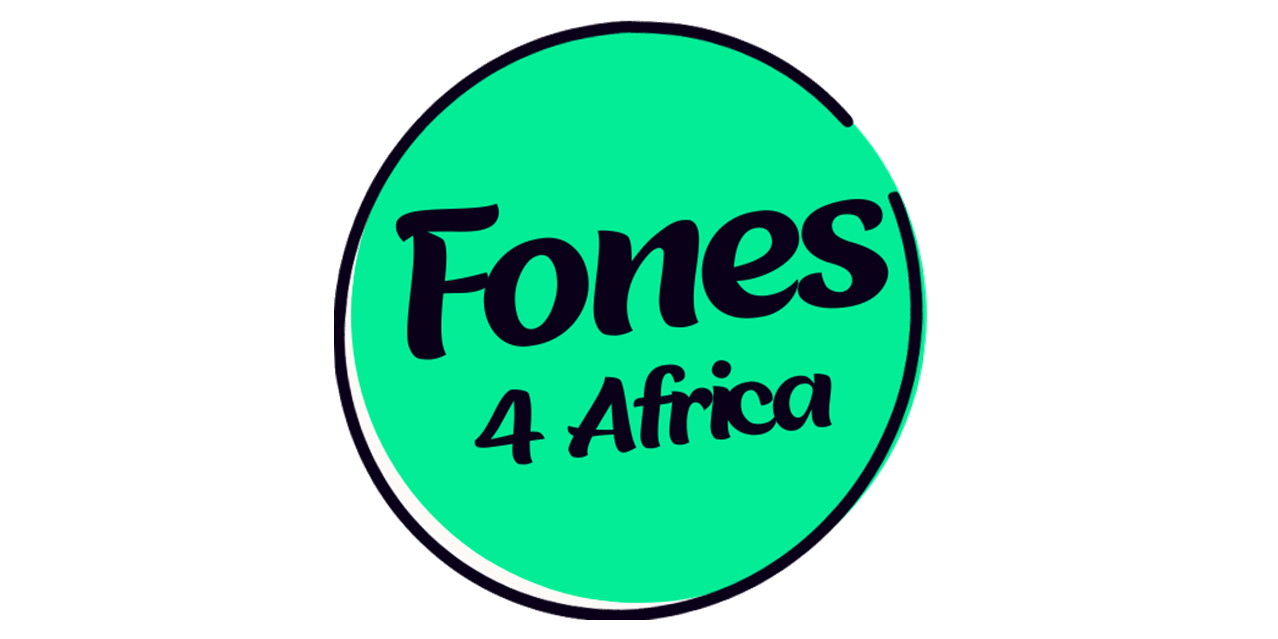
In the bustling world of technology, finding a reliable source for premium mobile phones and accessories can be a daunting task. However, fear not! Fones 4 Africa has emerged as a beacon of excellence, offering top-notch products at unbeatable prices. Let’s delve into what makes Fones 4 Africa a standout choice for tech enthusiasts.
Premium Phones at Unbeatable Prices
At Fones 4 Africa, quality meets affordability. Whether you’re eyeing the latest iPhone or a cutting-edge Samsung Galaxy, this online store has you covered. Here are some highlights:
- Apple iPhone 11: With prices ranging from R 6,499.00 to R 7,299.00, the iPhone 11 combines sleek design with powerful performance. Customers have rated it 3.83 out of 5 stars.
- Apple iPhone X: Priced between R 4,959.00 and R 5,299.00, the iPhone X boasts a stunning display and exceptional camera capabilities. Users have given it a perfect 5-star rating.
- Apple iPhone XS Max: For those who crave a larger screen, the XS Max (R 5,499.00 – R 6,999.00) delivers. Its 4.56 out of 5-star rating speaks volumes.
- Samsung Galaxy S21 Ultra: If Android is your preference, the S21 Ultra (R 8,499.00 – R 9,599.00) impresses with its camera prowess and sleek design (rated 4.7 out of 5 stars).
- Samsung Galaxy A70 (128GB): A budget-friendly option, the A70 (R 4,999.00 – R 5,099.00) strikes a balance between performance and price (rated 4.6 out of 5 stars).
- Apple iPhone XS: The XS (R 5,999.00 – R 6,399.00) continues to be a favorite among Apple enthusiasts, earning a perfect 5-star rating.
Seamless Shopping Experience
Fones 4 Africa understands the importance of convenience. Their user-friendly website allows you to shop on the go. Plus, with free shipping, you can enjoy your new gadget without any hassle.
Conclusion
In a world where technology evolves rapidly, Fones 4 Africa stands firm as a reliable partner for all your mobile needs. From premium phones to accessories, their commitment to quality and affordability is unwavering. Visit Fones.co.za today and experience excellence firsthand!
Disclaimer: This article is based on publicly available information and reflects positive aspects of Fones 4 Africa. Individual experiences may vary, but we celebrate the brand’s dedication to customer satisfaction.
Business
Raya is shootout hero as Arsenal reach Champions League quarters
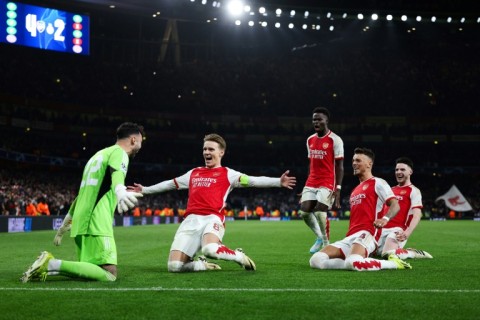
LONDON – David Raya was the hero as Arsenal beat Porto 4-2 on penalties on Tuesday to reach the Champions League quarter-finals for the first time since 2010.
The teams were locked at 1-1 on aggregate after an absorbing second leg at the Emirates but Raya saved twice in the shootout to break the hearts of the two-time champions.
The goalkeeper dived full stretch to deny Wendell and repeated the feat against Galeno, while the home side converted all four of their penalties as the decibel count soared.
It is the first time a Champions League match has been decided by penalties since the 2016 final between Real Madrid and Atletico Madrid.
“You are very nervous, you are hoping for the best but you know that it (the shootout) is a bit of a lottery,” Arsenal manager Mikel Arteta told TNT Sports.
“So happy. It has been 14 years (without reaching quarter-finals), which is a long time for a club like Arsenal and it shows how difficult it was. We really had to dig in to find the magic moment at the end.”
“We’ve been patient, worked so hard and a lot of people have made good decisions and showed courage in difficult moments and this is where you want to be,” he added.
Raya, on loan from Brentford, said it was a “great moment personally and collectively”.
“This means everything. You play football for these kind of things and I’m lucky to be playing for Arsenal, to be in the Champions League and to get through to the quarter-finals.”
Trailing 1-0 from the first leg, Arteta’s Premier League leaders — with 33 goals in their past eight league games — were not at their fluent best against a disciplined Porto side.
Leandro Trossard pulled Arsenal level on aggregate shortly before half-time as their patience paid off.
Sergio Conceicao’s men had succeeded in frustrating the home team for long spells during the opening period, fashioning enough chances of their own make it a nervy night for the expectant fans.
Both sides struggled to settle in a scrappy opening period, with Porto doing their best to slow the game down by taking their time with throw-ins and goal kicks, to the audible frustration of the home crowd.
Arsenal defender Ben White headed over in the fourth minute after the home side’s first sustained attack while captain Martin Odegaard hit the side netting 10 minutes later.
But Porto, who were last crowned European champions under Jose Mourinho in 2004, had a number of openings.
Evanilson whipped a shot at goal from distance that bounced wide and minutes later struck a rising strike that Raya palmed away.
Declan Rice headed just wide and Pepe — the first 41-year-old to play outfield in the Champions League — got the deftest of touches with his head to prevent Kai Havertz from connecting with a White cross at the back post.
– Breakthrough –
The breakthrough finally came in the 41st minute following good work from Odegaard, who jinked past an opponent and fed Trossard with a perfectly weighted low pass into the box.
Trossard calmly hit a right-footed shot past goalkeeper Diogo Costa and into the far corner of the net to ease the tension.
The visitors, who had never won a match in England in 22 previous attempts, started the second half brightly as Arsenal struggled to impose themselves.
Arsenal thought they had doubled their lead midway through the second half when Odegaard dinked the ball into an empty net but the goal was ruled out for a foul by Havertz on Pepe.
Moments later Porto streamed forward and Raya blocked Francisco Conceicao’s shot from the edge of the penalty area.
Arteta threw on Gabriel Jesus in the 83rd minute and the former Manchester City man nearly scored with his first touch.
As Arsenal pushed for a winner, Bukayo Saka produced a trademark curling effort that was punched back into the middle and Odegaard steered the rebound wide when well-placed.
The home side looked the more dangerous in the early stages of extra-time but Porto remained a threat on the break, with substitute Mehdi Taremi curling wide.
Arteta brought on Eddie Nketiah and Oleksandr Zinchenko for the second period of extra time but neither side could find a winner and it went to penalties.
By John Weaver
-
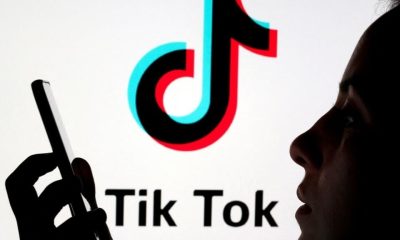
 Politics4 months ago
Politics4 months agoUS House of Representatives overwhelmingly passes TikTok ban bill
-

 Business7 months ago
Business7 months agoThe first minds to be controlled by generative AI will live inside video games
-

 Business7 months ago
Business7 months agoIndia is a ‘perfect’ emerging market for investors, ETF expert suggests
-
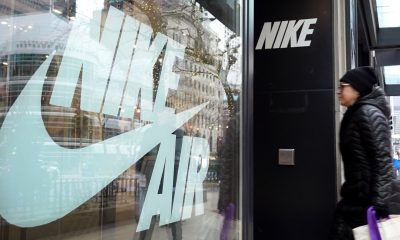
 Business7 months ago
Business7 months agoNike sinks 10% after it slashes sales outlook, unveils $2 billion in cost cuts
-
Business7 months ago
3 recent success tips from Mark Cuban, including what to keep in mind if you want to be a millionaire
-

 Business4 months ago
Business4 months agoJustice for AKA and Tibz | Unpacking the Ndimande brothers’ extradition
-

 Politics4 months ago
Politics4 months agoCharles de Gaulle’s eldest son, Philippe de Gaulle, dies aged 102
-
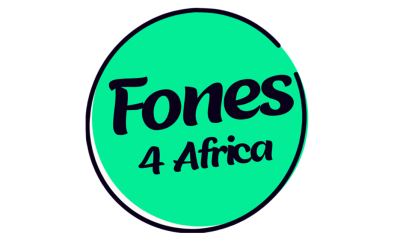
 Business4 months ago
Business4 months agoFones 4 Africa: Where Quality Meets Affordability


